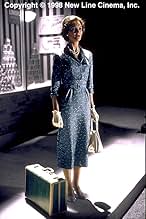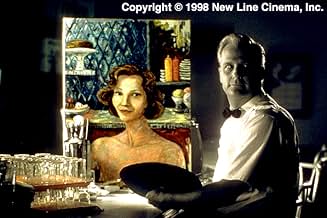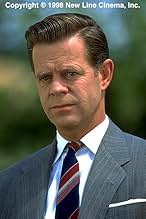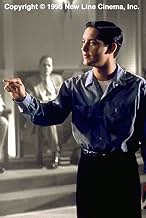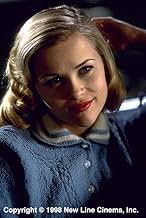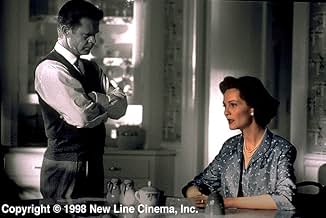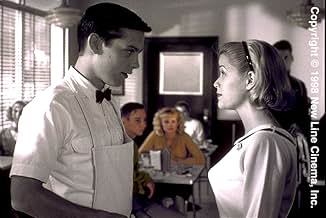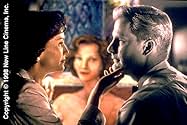Pleasantville
- 1998
- Tous publics
- 2h 4min
Deux frères et sœurs adolescents des années 1990 se retrouvent dans une sitcom des années 1950, où leur influence commence à changer profondément ce monde complaisant.Deux frères et sœurs adolescents des années 1990 se retrouvent dans une sitcom des années 1950, où leur influence commence à changer profondément ce monde complaisant.Deux frères et sœurs adolescents des années 1990 se retrouvent dans une sitcom des années 1950, où leur influence commence à changer profondément ce monde complaisant.
- Réalisation
- Scénario
- Casting principal
- Nommé pour 3 Oscars
- 18 victoires et 45 nominations au total
Avis à la une
...nor is it The Bicycle Thief, Casablanca, or Taxi Driver. But it's a damn nice modern take on Capra.
The reviewers here that're trashing this film are completely missing the point - they either know nothing about film, or way too much. It's a fable, folks, and if there's lapses in logic or some smarmy moments, well, deal with it. It's a marvelous, well constructed flick and an enjoyable way to spend a couple hours.
There's no blood, or explosions. A bit of sex, but nothing gratuitous and it's essential to the plot. Cue up a copy and prepare to smile.
It's keen...!
The reviewers here that're trashing this film are completely missing the point - they either know nothing about film, or way too much. It's a fable, folks, and if there's lapses in logic or some smarmy moments, well, deal with it. It's a marvelous, well constructed flick and an enjoyable way to spend a couple hours.
There's no blood, or explosions. A bit of sex, but nothing gratuitous and it's essential to the plot. Cue up a copy and prepare to smile.
It's keen...!
i wish i had the ability to put into a 1000 words what this movie impressed upon me. sadly enough, i am a verbose person, inclined to write and write and write, following a train of thought that never ends. however, i shall certainly give it a try, without botching it up. after having viewed this movie, i sat a while in my chair, watching the end credits play and listening to the music as it played along. not until the tape rewinded did i fully realise that i had watched a really good movie again, one that spoke on more levels than the simple obvious ones.
if i were to speak of one of the main things in this movie that are so incredibly important, it's the fact that it speaks about people and society, and the patterns inherent in them. in the beginning, you see reese witherspoon in a normal 90's class situation, following what is a 'normal' situation in that environment. then she is dropped into pleasantville, and what happens? she loses all reference points towards a life that seems right to her; she misses her pattern in life. the first thing that happens is she tries to enforce it again, resulting in the start of the major happenings of the movie, and somewhere along the line, softly swerves away from it and finds another pattern. once she reads a book, and stays put reading in it while she could have gone out to 'do it', you know things have changed.
william c. macy shows the same thing when he gets home, and his wife isn't there to greet him, and i could go on for ages to point to this, but i'd be overstepping my boundaries of these 1000 words, and definitely spoil someone elses movie experience. fact is, almost every single storyline in this movie is about change, change brought about because someone is stuck in a pattern and feels something is wrong, or through the self discovery that is inherent in every single one of us. not only that, it also shows how fear of breaking established patterns can bring out the worst, or get the upheaval that the major starts with his 'concerned citizens'. but even beyond all this, all the explanations and thought provoking issues that it brings up, if alone for the beauty of it and for the precious score that is attached, one should at least consider seeing it. i am personally a very jaded person concerning movies, having seen more than probably even a professional movie reviewer has seen taking my age as his career.
even with that in mind, i thank my lucky stars for picking this up on a whim and getting a look at something that has taken me in more than most of the movies this year. several of the scenes are priceless, and as someone before commented, the drive through a black and white scenery with coloured blossom weaving through the soft winds will leave you breathless.
in short, if you feel like watching a wonderful movie, catch this one and be impressed; try to follow the patterns every character exhibits and think about what the colour means in that sense, how it brings life back, how change is life.
if i were to speak of one of the main things in this movie that are so incredibly important, it's the fact that it speaks about people and society, and the patterns inherent in them. in the beginning, you see reese witherspoon in a normal 90's class situation, following what is a 'normal' situation in that environment. then she is dropped into pleasantville, and what happens? she loses all reference points towards a life that seems right to her; she misses her pattern in life. the first thing that happens is she tries to enforce it again, resulting in the start of the major happenings of the movie, and somewhere along the line, softly swerves away from it and finds another pattern. once she reads a book, and stays put reading in it while she could have gone out to 'do it', you know things have changed.
william c. macy shows the same thing when he gets home, and his wife isn't there to greet him, and i could go on for ages to point to this, but i'd be overstepping my boundaries of these 1000 words, and definitely spoil someone elses movie experience. fact is, almost every single storyline in this movie is about change, change brought about because someone is stuck in a pattern and feels something is wrong, or through the self discovery that is inherent in every single one of us. not only that, it also shows how fear of breaking established patterns can bring out the worst, or get the upheaval that the major starts with his 'concerned citizens'. but even beyond all this, all the explanations and thought provoking issues that it brings up, if alone for the beauty of it and for the precious score that is attached, one should at least consider seeing it. i am personally a very jaded person concerning movies, having seen more than probably even a professional movie reviewer has seen taking my age as his career.
even with that in mind, i thank my lucky stars for picking this up on a whim and getting a look at something that has taken me in more than most of the movies this year. several of the scenes are priceless, and as someone before commented, the drive through a black and white scenery with coloured blossom weaving through the soft winds will leave you breathless.
in short, if you feel like watching a wonderful movie, catch this one and be impressed; try to follow the patterns every character exhibits and think about what the colour means in that sense, how it brings life back, how change is life.
David (Tobey Maguire) is a geek in high school. Real life is diminishing expectations, family divorce and no female companionship. He's obsessed with an old TV show Pleasantville. While watching a Pleasantville marathon, he has a fight with his twin sister Jennifer (Reese Witherspoon) and they break the TV remote. TV repairman (Don Knotts) shows up and give them a special remote which sends them into the show. They become George (William H. Macy) and Betty Parker (Joan Allen)'s kids Bud and Mary Sue. She's not happy until she sees her new boyfriend Skip Martin (Paul Walker). Bud is working at Bill Johnson (Jeff Daniels)'s soda shop. He falls for Margaret Henderson (Marley Shelton). The kids' interactions start changing the strange purity of Pleasantville and colors seeps into the world.
At first, this is a gimmick that has some cute aspects. Don Knotts adds to that sense of a cheap laugh. It has some good fun with Maguire and Witherspoon budding head. Then the deeper profound message seeps into the movie. It is gentle and yet undeniable. A couple of times, I feared the movie would push too hard like calling the people "color". It manages to maintain some distance and follow through on the message without overpowering it. This is quite a film.
At first, this is a gimmick that has some cute aspects. Don Knotts adds to that sense of a cheap laugh. It has some good fun with Maguire and Witherspoon budding head. Then the deeper profound message seeps into the movie. It is gentle and yet undeniable. A couple of times, I feared the movie would push too hard like calling the people "color". It manages to maintain some distance and follow through on the message without overpowering it. This is quite a film.
10Eddie C.
I knew what this film would be about before I rented it, but I'm stunned that it would be THIS good. Nothing against "Saving Private Ryan" or "Shakespeare in Love", but this film should have won Best Picture in 1998 and it was a shame that it wasn't nominated. It's an even bigger injustice that it did not get a nomination for best screenplay or cinematography.
In the hands of another writer, this movie could have been made as just a parody of 1950's sitcoms like "Leave It To Beaver" or "Ozzie and Harriet." But this film isn't about how clichéd those series look decades later. It's about the false nostalgia for a past that never existed. We survived the past and we know that everything turned out all right. Because of this, we selectively choose our memories and weed out the unpleasant ones. That's why the past is sometimes seen as "the good ol' days." Pleasantville does not represent how the 50's actually were but rather an idealization of what people THINK the 50's were---no one had sex, everyone got along swell, and life was fairly easy. Nothing could be further from the truth, and there are many film from that era which show how real people (even in suburbia) actually lived. This film argues that free will and choice is ESSENTIAL to life and that we should embrace freedom instead of fearing it. It isn't just about making out, but having the OPTION to make out.
Another reviewer claimed that this film was an attack on the 50's, but David and Jennifer could very easily have been dumped in the world of "The Brady Bunch", "Gilligan's Island" , or "Batman." But setting "Pleasantville" in a 1950's sitcom allows for the brilliant metaphor of black and white versus color. Black and white photography is a stylized depiction of the universe, but unless you're color blind it's not the way you actually see the universe. When we first see Pleasantville's citizens, all of them are cardboard cut-outs of stereotypes. As they begin to open up and become real people, color seeps into their world. The catalyst seems to be the willingness to experience new sensations and become vulnerable. Jennifer has slept with lot of guys when she was in the normal world, so sex does not change HER into a color character. On the other hand, when she actually finishes a book (without pictures) for the first time in her life, THEN she becomes colorized. Similarly, David does not bloom into color until he breaks out of his aloofness and defends his "mother." Compare the way he ignores his real mother at the beginning of the film to how he consoles and comforts her at the end to see how much David has changed.
I could go on and on, but I think you get the idea. There are a lot of films out there that are very entertaining and/or very moving--like "Raiders of the Lost Ark" or "Titanic." Movies like "Pleasantville" which challenge the audience and force them to think are very rare, and should be treasured by the discerning filmgoer.
In the hands of another writer, this movie could have been made as just a parody of 1950's sitcoms like "Leave It To Beaver" or "Ozzie and Harriet." But this film isn't about how clichéd those series look decades later. It's about the false nostalgia for a past that never existed. We survived the past and we know that everything turned out all right. Because of this, we selectively choose our memories and weed out the unpleasant ones. That's why the past is sometimes seen as "the good ol' days." Pleasantville does not represent how the 50's actually were but rather an idealization of what people THINK the 50's were---no one had sex, everyone got along swell, and life was fairly easy. Nothing could be further from the truth, and there are many film from that era which show how real people (even in suburbia) actually lived. This film argues that free will and choice is ESSENTIAL to life and that we should embrace freedom instead of fearing it. It isn't just about making out, but having the OPTION to make out.
Another reviewer claimed that this film was an attack on the 50's, but David and Jennifer could very easily have been dumped in the world of "The Brady Bunch", "Gilligan's Island" , or "Batman." But setting "Pleasantville" in a 1950's sitcom allows for the brilliant metaphor of black and white versus color. Black and white photography is a stylized depiction of the universe, but unless you're color blind it's not the way you actually see the universe. When we first see Pleasantville's citizens, all of them are cardboard cut-outs of stereotypes. As they begin to open up and become real people, color seeps into their world. The catalyst seems to be the willingness to experience new sensations and become vulnerable. Jennifer has slept with lot of guys when she was in the normal world, so sex does not change HER into a color character. On the other hand, when she actually finishes a book (without pictures) for the first time in her life, THEN she becomes colorized. Similarly, David does not bloom into color until he breaks out of his aloofness and defends his "mother." Compare the way he ignores his real mother at the beginning of the film to how he consoles and comforts her at the end to see how much David has changed.
I could go on and on, but I think you get the idea. There are a lot of films out there that are very entertaining and/or very moving--like "Raiders of the Lost Ark" or "Titanic." Movies like "Pleasantville" which challenge the audience and force them to think are very rare, and should be treasured by the discerning filmgoer.
Two 1990s teenagers find themselves in a 1950s sitcom where their influence begins to profoundly change that complacent world.
This is a surprisingly strong role for Reese Witherspoon, who tends to be an overrated actress. If anything, she is actually underrated here for how well she made Jenny her own character. The appearance of Don Knotts is a great touch, and William H. Macy is wonderful as always.
While a simple concept (kids getting sucked into the TV), the execution is a work of genius. Writer-director Gary Ross used this backdrop to explore race relations, the "good old days", changing cultures and mores... and exploring a range of "right and wrong". And underneath it all, it still remains a sense of humor and does not attempt to guilt trip the audience.
This is a surprisingly strong role for Reese Witherspoon, who tends to be an overrated actress. If anything, she is actually underrated here for how well she made Jenny her own character. The appearance of Don Knotts is a great touch, and William H. Macy is wonderful as always.
While a simple concept (kids getting sucked into the TV), the execution is a work of genius. Writer-director Gary Ross used this backdrop to explore race relations, the "good old days", changing cultures and mores... and exploring a range of "right and wrong". And underneath it all, it still remains a sense of humor and does not attempt to guilt trip the audience.
Le saviez-vous
- AnecdotesAt one point, when Jennifer tries to use a bathroom there aren't any toilets. This is a clever reference to an FCC ruling during the 1950's, which stated that toilets (or any reference to their use, such as the sound of flushing) could not be presented on television. While this continued on broadcast television well in to the late seventies, the barrier in movies fell in 1960 (two years after the Pleasantville scenario) when Alfred Hitchcock persuaded the film censors to allow the flushing of a toilet in Psychose (1960) because it was integral to the iconic shower scene.
- GaffesVarious inconsistencies and plot holes (stopped clocks, phantom opposing basketball teams) with the real world are consistent with Pleasantville being a TV world, and hence consistent with the movie.
- Crédits fousThe New Line logo plays in complete silence.
- ConnexionsFeatured in Fiona Apple: Across the Universe (1998)
- Bandes originalesAcross the Universe
Written by John Lennon and Paul McCartney
Performed by Fiona Apple
Produced by Jon Brion
Courtesy of Clean Slate/The WORK Group
Meilleurs choix
Connectez-vous pour évaluer et suivre la liste de favoris afin de recevoir des recommandations personnalisées
Détails
- Date de sortie
- Pays d’origine
- Langue
- Aussi connu sous le nom de
- Amor a colores
- Lieux de tournage
- Petaluma, Californie, États-Unis(Scenes filmed at Petaluma Blvd and Western Ave.)
- Sociétés de production
- Voir plus de crédits d'entreprise sur IMDbPro
Box-office
- Budget
- 60 000 000 $US (estimé)
- Montant brut aux États-Unis et au Canada
- 40 584 421 $US
- Week-end de sortie aux États-Unis et au Canada
- 8 855 063 $US
- 25 oct. 1998
- Montant brut mondial
- 49 805 462 $US
- Durée
- 2h 4min(124 min)
- Couleur
- Mixage
- Rapport de forme
- 1.85 : 1
Contribuer à cette page
Suggérer une modification ou ajouter du contenu manquant



